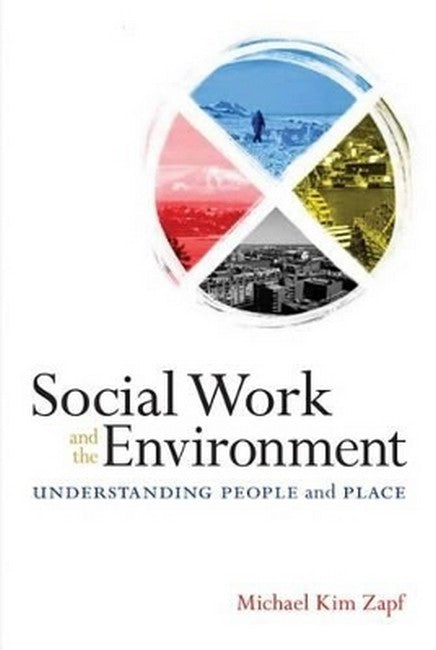Michael Kim Zapf is a Professor Emeritus of Social Work with the University of Calgary. Building on his early practice years in the Yukon Territory and three decades in academia, his research and writing have focused on social work practice and education in rural, remote, and Aboriginal communities.
Request Academic Copy
Please copy the ISBN for submitting review copy form
Description
Acknowledgements* Introduction: The Environment, Social Work, and Ecological Thinking* The Environmental Imperative and Social Work* Author and Voice* Organization of the Book* Thinking Ecologically* Chapter One: Smoke and Mirrors: How the Environment Became the Social Environment* The Effect: Personal Observations of the Vanished Environment* Beginnings: Lighting the Match* The 1980s and 1990s: Still Smokin'* The 2000s: Illusion Reaffirmed* Variations on the Illusion* Chapter Two: False Starts and Sputterings: Partial Efforts to Include the Physical Environment* The Physical Environment as Window Dressing* The Physical Environment Limited to Agency or Client Environs* Diagrams and the Disappearing Physical Environment* Assessment and the Absent Physical Environment* Case Studies: Physical Environment as a Rurual Consideration* Environmentalist or Social Worker?* Chapter Three: Clearing Space in the Conceptual Brambles: Incorporating the Physical Environment* Beginnings* Mid-1990s Forum* Environment as Central* Place and Space in Social Work* Chapter Four: Rural/Remote Social Work: Environmental Context and Place* Rurality and Rural Social Work* Divergent Paths for Rural Social Work* A Personal Example from the Northern Canadian Context* Remote Practice* A Sense of Place* Chapter Five: Environment as Sacred: Spirituality, Deep Ecology, and Aboriginal Perspectives* Spirituality and Social Work* Spirituality and the Environment: Smoke and Mirrors Again?* Spiritual Interventions and the Environment* Deep Ecology* Aboriginal Social Work: Traditional Knowledge, the Land, and Identity* Chapter Six: International Social Work: Environment, Devleopment, and Sustainability* International Social Work and Global Environmental Citizenship* Development and the Environment* International Voices for Sustainable Development* International Social Work Organizations: Glimpses of the Environment* Chapter Seven: Perspectives from Other Disciplines: The Environment and a Sense of Place* Painting: Encounters with Landscape* Film: Telling a Place* Music: Soundscapes and Expressions of Locality* Viticulture: Terroir and Place Value* Sociology: Habitus and Embodied Sense of Place* Psychology: Environments, Place, and Behaviour* Environmental Design: Placemaking and Positive Space* Geography: Earthkeeping and Places that Matter* Education: Wayfinding and Living Well in Place* Summary: Place, Sustainability, and Multidisciplinary Efforts* Chapter Eight: Language and Disfluency: Expressing the Environment in Social Work* Visual Cues: Punctuation and Capitalization* Language and Limitations* Prepositions and Propositions* Disfluency and Environmental Discourse* Chapter Nine: People as Place* Reclaiming the Environment: Recognizing Place and Stewardship* Models and Metaphors: Retiring "Person-in-Environment"* Social Purpose: Living Well in Place* Implications* References
This is a paradigm-breaking book that overturns a foundational metaphor and confronts the boundaries of dualistic thinking, thereby enabling social work to engage in the significant social/environmental issues facing the planet today. Building from Zapf's rethinking of the importance of 'place' in social work theory and practice, the profession can break from the constraints of tradition and finally move forward to respond effectively to the pressing issues of environmental destruction, sustainability, and spirituality." - John Coates, Department of Social Work, St. Thomas University, Fredericton, New Brunswick, Canada

